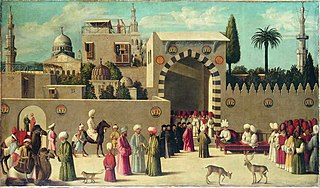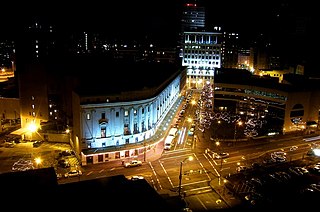Related Research Articles

John Locke was an English philosopher and physician, widely regarded as one of the most influential of Enlightenment thinkers and commonly known as the "Father of Liberalism". Considered one of the first of the British empiricists, following the tradition of Sir Francis Bacon, Locke is equally important to social contract theory. His work greatly affected the development of epistemology and political philosophy. His writings influenced Voltaire and Jean-Jacques Rousseau, and many Scottish Enlightenment thinkers, as well as the American Revolutionaries. His contributions to classical republicanism and liberal theory are reflected in the United States Declaration of Independence. Internationally, Locke’s political-legal principles continue to have a profound influence on the theory and practice of limited representative government and the protection of basic rights and freedoms under the rule of law.

In art history, literature and cultural studies, Orientalism is the imitation or depiction of aspects in the Eastern world. These depictions are usually done by writers, designers, and artists from the West. In particular, Orientalist painting, depicting more specifically "the Middle East", was one of the many specialisms of 19th-century academic art, and the literature of Western countries took a similar interest in Oriental themes.

William Foxwell Albright was an American archaeologist, biblical scholar, philologist, and expert on ceramics.

Howard Harold Hanson was an American composer, conductor, educator, music theorist, and champion of American classical music. As director for 40 years of the Eastman School of Music, he built a high-quality school and provided opportunities for commissioning and performing American music. In 1944, he won a Pulitzer Prize for his Symphony No. 4, and received numerous other awards including the George Foster Peabody Award for Outstanding Entertainment in Music in 1946.

The Eastman School of Music is the music school of the University of Rochester in Rochester, New York. It was established in 1921 by industrialist and philanthropist George Eastman.

In music, modernism is an aesthetic stance underlying the period of change and development in musical language that occurred around the turn of the 20th century, a period of diverse reactions in challenging and reinterpreting older categories of music, innovations that led to new ways of organizing and approaching harmonic, melodic, sonic, and rhythmic aspects of music, and changes in aesthetic worldviews in close relation to the larger identifiable period of modernism in the arts of the time. The operative word most associated with it is "innovation". Its leading feature is a "linguistic plurality", which is to say that no one music genre ever assumed a dominant position.
Inherent within musical modernism is the conviction that music is not a static phenomenon defined by timeless truths and classical principles, but rather something which is intrinsically historical and developmental. While belief in musical progress or in the principle of innovation is not new or unique to modernism, such values are particularly important within modernist aesthetic stances.

Bruno Nettl was an ethnomusicologist and musicologist.
Daniel Albright was the Ernest Bernbaum Professor of Literature at Harvard and the editor of Modernism and Music: An Anthology of Sources. He was born and grew up in Chicago, Illinois and completed his undergraduate studies on a full scholarship at Rice in 1967. He received his MPhil in 1969 and PhD in 1970, both from Yale. Albright is also the author of the book Quantum Poetics which was published by Cambridge University Press in 1997. He held an NEH fellowship from 1973 to 1974, was a Guggenheim Fellow from 1976 to 1977, and more recently, he was a 2012 Berlin Prize Fellow at the American Academy in Berlin.
Samuel Hans Adler is an American composer, conductor, author, and professor. During the course of a professional career which ranges over six decades he has served as a faculty member at both the University of Rochester's Eastman School of Music and the Juilliard School. In addition, he is credited with founding and conducting the Seventh Army Symphony Orchestra which participated in the cultural diplomacy initiatives of the United States in Germany and throughout Europe in the aftermath of World War II. Adler's musical catalogue includes over 400 published compositions. He has been honored with several awards including Germany's Order of Merit – Officer's Cross.
Norman Golb was the Ludwig Rosenberger Professor in Jewish History and Civilization at the Oriental Institute of the University of Chicago.

Alain Leroy Locke was an American writer, philosopher, educator, and patron of the arts. Distinguished in 1907 as the first African-American Rhodes Scholar, Locke became known as the philosophical architect —the acknowledged "Dean"— of the Harlem Renaissance. He is frequently included in listings of influential African Americans. On March 19, 1968, the Rev. Dr. Martin Luther King Jr. proclaimed: "We're going to let our children know that the only philosophers that lived were not Plato and Aristotle, but W. E. B. Du Bois and Alain Locke came through the universe."
Arne Oldberg was an American pianist, composer, and teacher. He spent his career on the faculty of Northwestern University (1897–1941), where he taught piano and composition and, from 1924 until his retirement in 1941, served as director of the graduate department of the Music School. Among his students were composers Howard Hanson, Cecilia Clare Bocard, Theodora Troendle, Mildred Lund Tyson, and Ella May Walker.

Philip Brett was a British-born American musicologist, musician and conductor. He was particularly known for his scholarly studies on Benjamin Britten and William Byrd and for his contributions to the development of lesbian and gay musicology. At the time of his death, he was Distinguished Professor of Musicology at the University of California, Los Angeles.

Byron Adams is an American composer, conductor, and musicologist.

Deepak Shimkhada is a Nepali American educator, artist, art historian, author and community leader. He currently serves as an adjunct professor at Chaffey College in Rancho Cucamonga, California. He has previously held visiting and adjunct appointments at several universities in the United States, including Scripps College, Claremont Graduate University, California State University, Northridge, University of the West, and Claremont School of Theology]]. His teaching career began in 1980 and although he is fully retired from full-time teaching, he currently teaches Asian art part-time at Chaffey College.
Robert Mills Delaney, sometimes incorrectly spelled Delany was an American composer and teacher. Born in Baltimore, Maryland, Delaney began studying the violin as a child in Hanover, Pennsylvania, with Walter Shultz. His musical education continued at the Combs College of Music, where he studied with Henry Schradieck and William Geiger. In 1921, Delaney began undergraduate studies in music at the University of Southern California, but he left the school in 1922 to accompany his parents, Charles Roderic and Anna Louise Delaney, on a trip around the world. After returning from the trip, Delaney resumed his music studies but now in Europe: from 1925–1928, he attended the École Normale de Musique de Paris; the Sorbonne ; and the Conservatoire Américain de Fontainebleu, France. While in France, he studied violin with Maurice Reuchsel, Lucien Capet, and Léon Nauwick and composition with Nadia Boulanger, Arthur Honegger, Gustav Holst, Ralph Vaughan Williams, and G. Francesco Malipiero.
David Richard Widdess, FBA is a musicologist and academic. Since 2005, he has been Professor of Musicology at the School of Oriental and African Studies, University of London.

Joseph Paul Locke is an American jazz vibraphonist.
Jonathan Mark Dunsby is a British classical pianist, musicologist, author and translator, particularly known for his research in musical analysis. His introductory textbook, Music Analysis in Theory and Practice (1988), co-authored with Arnold Whittall, is a standard work in the field. Dunsby has held professorships at the University of Reading (1985–2006) in the UK, and SUNY University at Buffalo (2006–7) and the Eastman School of Music, University of Rochester in the United States, and was the founding editor-in-chief of the journal Music Analysis (1982–86).

The Howard School of International Relations is a school of academic thought originating at Howard University in the decades between the 1920s and 1950s. Articulated by scholars such as Merze Tate, Ralph Bunche, Alain Locke, E. Franklin Frazier, Rayford Logan, and Eric Williams, the Howard School emphasized race and empire in the study of international relations. These scholars posed a sustained critique of dominant international relations theories such as racial hierarchy, which vindicated the Jim Crow era in the U.S as well as the practice of colonialism in the world through the 1960s.
References
- ↑ "Eastman Studies in Music Series Celebrates Landmark Volume" . Retrieved 2020-12-13.
- ↑ "Author: Ralph P. Locke" . Retrieved 2020-12-13.
- ↑ Mabilat, Claire, 1980- (2008). Orientalism and representations of music in the nineteenth-century British popular arts. Ashgate. p. 12. OCLC 166290630 . Retrieved 2020-12-13.CS1 maint: multiple names: authors list (link)
- ↑ "Ralph P. Locke". Eastman School of Music. Retrieved 2020-12-13.